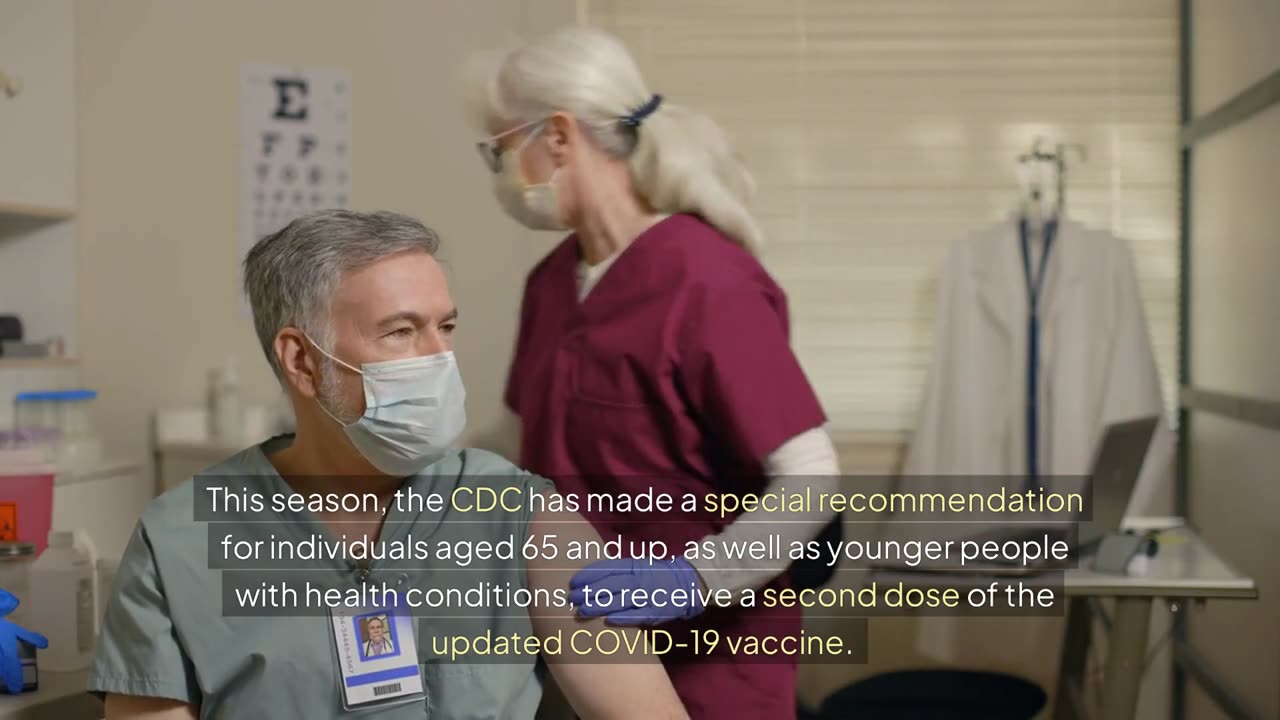Premium Only Content

Are You 50 or Older? Here Are the Must-Have Vaccines for a Healthier Season
**Introduction:**
Are you ready for a healthier, more protected season? If you’re 50 or older, staying up-to-date on vaccinations isn’t just a recommendation—it’s a powerful step in safeguarding your well-being against serious diseases. The CDC has lowered the age threshold for certain vaccines, like the pneumococcal vaccine, and rolled out fresh guidance on other essential shots. But with multiple vaccines available, it’s easy to get overwhelmed. Let’s dive into exactly which vaccines you need, why they’re essential, and how they can protect you and your loved ones this season.
---
Pneumococcal Vaccine: Now Recommended for Those 50 and Older**
The CDC’s updated recommendation for the pneumococcal vaccine is great news for those in their 50s. Why? Pneumonia is a serious infection that can severely impact the lungs, often leading to hospitalizations, especially in older adults. This vaccine helps defend against pneumococcal bacteria, one of the main culprits behind bacterial pneumonia.
**Why It Matters:**
Pneumococcal infections can lead to not just pneumonia but also meningitis and bloodstream infections, both of which can be life-threatening. The CDC’s decision to lower the recommended age reflects growing awareness of the risks these infections pose to people over 50. Even if you feel healthy, your immune system can weaken as you age, making this vaccine a vital piece of your health strategy.
**Who Should Get It?**
Adults 50 and older, especially those with chronic lung conditions or compromised immune systems, are strongly encouraged to get vaccinated. If you have other risk factors, like diabetes or heart disease, consider this vaccine an essential addition to your seasonal health checklist.
**RSV Vaccine: A New Tool for Respiratory Health**
Another major addition to the vaccine lineup is the RSV (respiratory syncytial virus) vaccine. Though RSV is often thought of as a childhood illness, it poses a severe risk to older adults. The CDC recommends this vaccine to all adults 75 and older, but those between 60 and 74 with health conditions like heart disease or diabetes are also eligible.
**What RSV Does:**
RSV can cause serious respiratory infections that lead to complications like bronchitis and pneumonia, particularly in seniors. Unlike flu and COVID-19 vaccines, the RSV vaccine isn’t an annual shot, which means that once you’re vaccinated, you’re set for this season.
**Is It Right for You?**
If you’re over 60 and dealing with chronic health issues or a weakened immune system, this vaccine can provide invaluable protection. Talk to your healthcare provider to determine if the RSV vaccine is right for you.
### 3. **COVID-19 Vaccine: Staying Up-to-Date for Maximum Protection**
COVID-19 may no longer dominate headlines, but the virus is still circulating, and older adults remain one of the most vulnerable groups. The CDC now advises adults 65 and older to get an updated booster six months after their last COVID-19 shot. This booster is especially vital for those who are immunocompromised.
**Why an Extra Shot Matters:**
COVID-19 variants continue to evolve, and while vaccines may not prevent all infections, they are incredibly effective at reducing the severity of symptoms and preventing hospitalizations. The updated COVID-19 shot specifically targets newer variants, offering a better line of defense as we move into colder months.
**Who Needs It?**
If you’re 65 or older or have an immune-compromising condition, consider the updated COVID-19 shot part of your health routine. The booster is designed to work alongside your previous vaccines, giving your immune system a significant boost in its fight against newer variants.
**Annual Flu Vaccine: Protecting Against a Familiar Foe**
The flu may feel like a familiar enemy, but it’s still one of the most common causes of seasonal illness and complications among seniors. An annual flu shot is recommended for everyone aged six months and up, but it’s especially crucial for older adults.
**Why Every Year?**
The flu virus changes annually, which is why each year’s vaccine is tailored to combat the most common circulating strains. For older adults, the flu shot helps reduce the risk of severe symptoms, hospitalizations, and in some cases, death.
**Best Time to Get It:**
The CDC recommends getting the flu shot in October or November. This timing ensures your body has ample time to build immunity before flu season peaks. If you’re 50 or older, the flu shot should be a staple in your yearly health regimen.
Shingles Vaccine: A Guard Against a Painful Disease**
Shingles, caused by the same virus responsible for chickenpox, can lead to a painful, blistering rash that primarily affects older adults. While shingles isn’t life-threatening, its complications can be severe and debilitating, sometimes causing long-lasting nerve pain.
**What to Know:**
The CDC recommends the shingles vaccine, known as Shingrix, for adults over 50. This two-dose vaccine is highly effective at preventing shingles and its complications. Since many people over 50 have had chickenpox, the shingles virus lies dormant in their bodies, with the potential to reactivate later in life.
**Why You Should Consider It:**
If you’re over 50, shingles can be a painful, lingering experience. Getting vaccinated not only reduces your risk but also helps prevent postherpetic neuralgia, a type of chronic pain that can persist even after the rash has healed.
---
Make This Season Your Healthiest Yet**
With the CDC’s updated vaccine recommendations, staying healthy and resilient is easier than ever. These vaccines are designed to tackle some of the most common and serious illnesses affecting older adults, from pneumonia and flu to COVID-19 and shingles. Taking proactive steps today can help you enjoy a healthier, more vibrant season.
So, if you’re 50 or older, schedule an appointment with your healthcare provider to discuss your vaccine options. Protecting yourself isn’t just a personal choice; it also helps protect those around you by reducing the spread of infections in the community.
If you found this article helpful, please subscribe, like, share, and leave a comment below. Your support helps us keep providing valuable content to keep you and your loved ones healthy. Here’s to a safe and healthy season!
-
 37:44
37:44
Glenn Greenwald
18 hours agoGlenn On Tearing Down the Military Industrial Complex, Exposing Pro-Israel Indoctrination, and More | SYSTEM UPDATE #411
131K136 -
 4:04:20
4:04:20
Nerdrotic
17 hours ago $55.57 earnedAmazon Takes 007! Hollywood is Lost, Disney Cancels WHO? | Friday Night Tights 342 /w ItsAGundam
190K53 -
 43:27
43:27
Tucker Carlson
16 hours agoRay Dalio: America’s Hidden Civil War, and the Race to Beat China in Tech, Economics, and Academia
195K199 -
 56:56
56:56
Candace Show Podcast
17 hours agoEXCLUSIVE: Taylor Swift Will Be Deposed. | Candace Ep 150
237K174 -
 1:03:52
1:03:52
IsaacButterfield
13 hours ago $10.07 earnedRepublican Vs 25 Transgender Activists | Jewish Outrage | Lizzo Loses All the Weight
81K21 -
 1:10:23
1:10:23
Edge of Wonder
17 hours agoChinese Biochips Hacking Minds? Quantum Control & Journey Song Mandela Effect
97.2K9 -
 2:15:46
2:15:46
Quite Frankly
20 hours ago"Ghosts, Robotics, and OBE's" ft. Dr. Albert Taylor 2/21/25
87.2K19 -
 55:52
55:52
LFA TV
1 day agoMaking Germany Great Again | TRUMPET DAILY 2.21.25 7PM
58.3K10 -
 1:52:26
1:52:26
2 MIKES LIVE
16 hours ago2 MIKES LIVE #183 Open Mike Friday with Hannah Faulkner and Adelia Kirchner!
42.9K -
 12:09
12:09
MrBigKid
16 hours ago $3.46 earnedNew Mossberg 590R: Tactical Homestead Defender
46.8K7